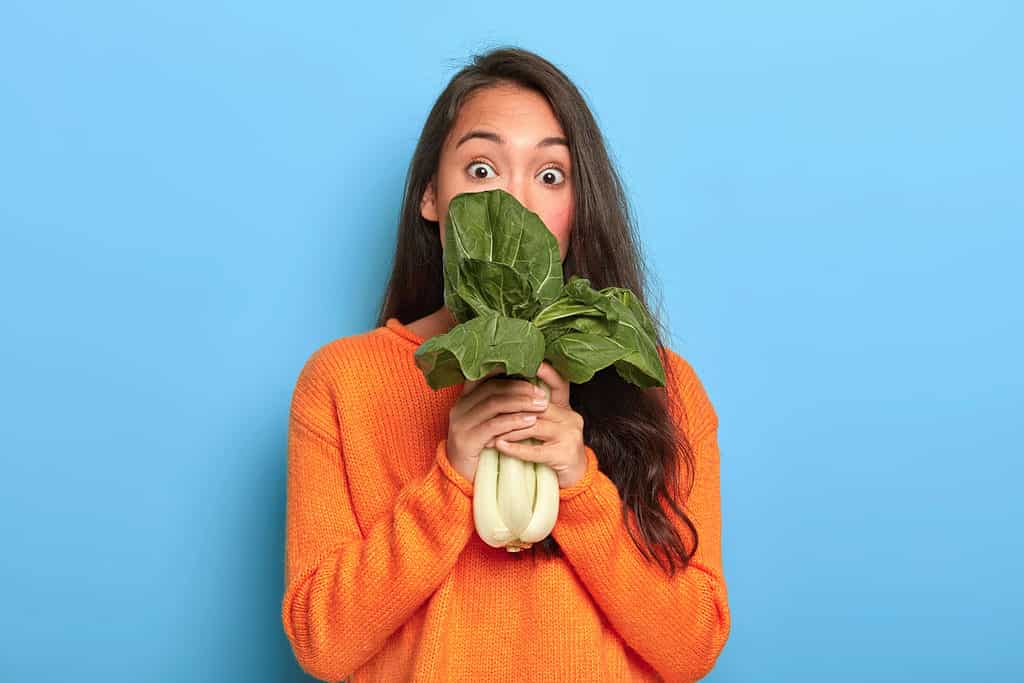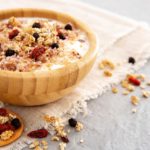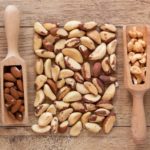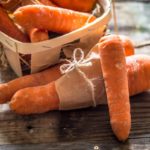
Carly Hanna
BSc (Human Nutrition and Psychology)
Vegan and vegetarian diets might cause several health issues, if they are not well-planned and followed.
These issues can be related to mental health disorders, such as
- depression
- anxiety
- eating disorders
as well as physical health conditions, including
- hair and skin issues
- weight/developmental growth
- choline and heavy metal intake
- protein absorption
- thyroid issues
In this article, we will look into the studies and research and see which of these claims are correct and which claims need more data.
Vegan diet and an increased risk of depression
There is evidence for and against a relationship between vegetarian and vegan diets and the incidence and prevalence of depression.
Some studies have shown that the odds of depression in those following a vegetarian or vegan diet is twice as likely compared to an omnivore.[1]
A recent systematic review (which looks at all previous studies on this topic), showed that
- 11/25 studies had no association between vegetarian and/or vegan diets and the risk of depression
- 7/25 studies had no association between vegetarian and/or vegan diets and the increase in the risk of depression
- 7/25 studies had a lower risk of vegetarians and/or vegan diets and depression[2]
In saying that, another study concluded that in Western cultures vegetarian diet is associated with a higher risk of depression and anxiety disorders.
It is quite likely that increased risk of depression is due to nutritional deficiencies. However, an important variable here is also the mental aspect, where individuals on vegan and vegetarian diets have concerns with incongruent ethical values and are sensitive to animal rights/welfare and environmental issues.
This worldview and perspective might have a negative impact on their mental health, possibly causing or increasing their risk of depression.
Strict vegetarian diet and an increased risk of anxiety disorder
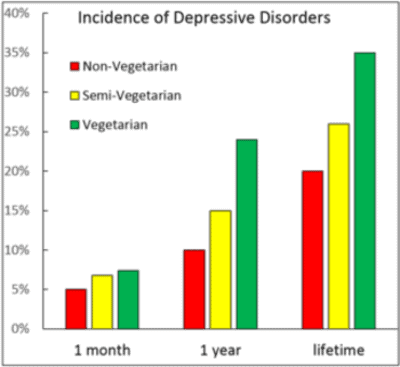
Anxiety is a multifaceted mental health problem that can be due to stressors, social factors, as well as nutritional deficiencies.
Eating is a big part of social gatherings and an expression of culture. Having any dietary requirements, such as being vegetarian or vegan, can interfere with these occasions and create social anxiety around being judged by others.[3]
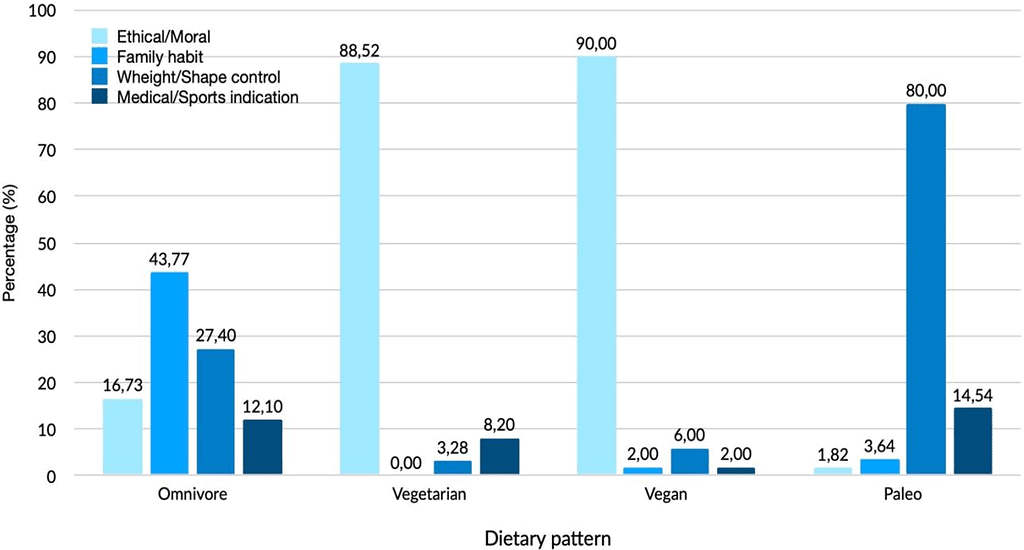
In terms of nutritional deficiencies, there are several vitamins and minerals that are important for brain health, including but not limited to
- omega 3 fatty acids
- iron
- zinc
- vitamin B12
- magnesium
RELATED — Magnesium (for a great night of sleep)
In terms of vegetarian and/or vegan diets and the association with anxiety disorders, the majority of research indicates a lower risk.
However, in subgroups under the age of 26 years old, there is a higher risk of anxiety in vegetarians and/or vegans, compared to omnivores.
There were no significant differences in mental health outcomes between how long the vegetarian and/or vegan diet was followed for.[4]
Risk of developing an eating disorder
The risk of eating disorders, such as orthorexia and anorexia, may be more common in vegetarians and vegans, especially if they are in the adolescent stage.
Orthorexia is an eating disorder that is characterized as restricting foods that are deemed “unhealthy” and only eating foods that are “good for our health”.
Anorexia is an eating disorder that is characterized as restricting food intake, but isn’t typically discriminative between foods.
Youth and young adults (aged 15-24) are most at risk of eating disorders, and there has been a correlational link between vegetarianism and eating disorders.
Vegan and vegetarians have higher rates of eating disorders
Some research shows that compared to the general population, clinical eating disorder groups have a higher rate of vegetarians.[5]
Adolescent vegetarians are also twice as likely to exhibit restrictive eating behaviors, compared to non-vegetarian teens.[5]
However, there is no causal link between prevalence, maintenance and/or recovery status of people with eating disorders and vegetarian and/or vegan diets.
RELATED — Understanding Eating Disorders: History, Types and Statistics
It is important to note that not all dietary behavior are clinically significant to meet an eating disorder diagnosis.[6]
Vegetables and heavy metal intake
A high intake of heavy metals, such as
- cadmium
- mercury
- lead
- chromium
- arsenic
can be toxic to humans and can induce food poisoning.
Symptoms of a high heavy metal intake/poisoning can include
- abdominal pain
- fever (chills and high body temperature)
- dehydration
- diarrhea
- nausea and vomiting
- fatigue/feeling weak
Meat and seafood have high levels of heavy metals, especially mercury and lead.
However, plant-based foods, such as
- rice
- green leafy vegetables
- potatoes
- strawberries
also have high amounts of heavy metals.[7]
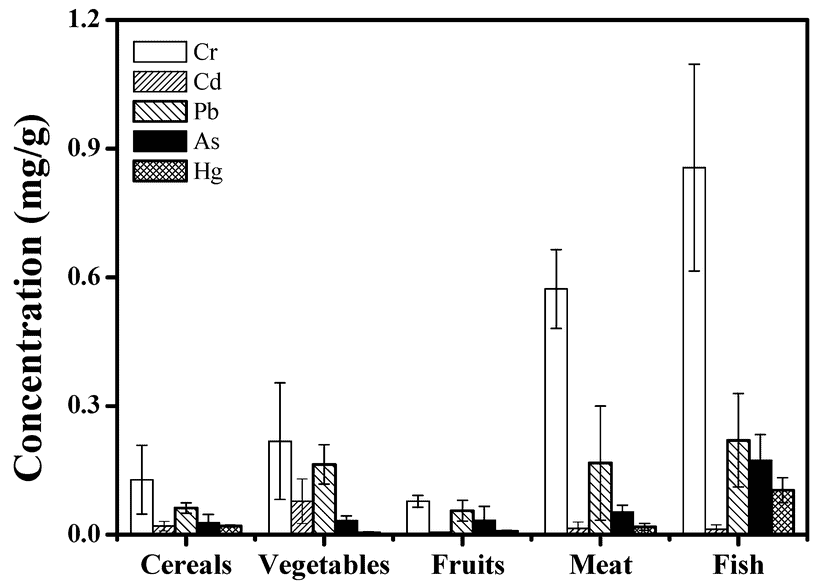
Source: Liang, G. Analysis of Heavy Metals in Foodstuffs and an Assessment of the Health Risks to the General Public via Consumption in Beijing, China. (2019)
Heavy metal levels in produce can also depend on the soil that they are grown in.[8]
Some research has shown that to counteract high cadmium intake is to have a high zinc intake, as these elements compete for absorption.
RELATED — Zinc (for immunity, skin health and libido)
Other research has shown that the bioavailability of heavy metals may be lower in plant-based foods than in animal-derived foods. For example, whole grains can eliminate up to 90% of lead absorption into the body due to the high phytate content competing for absorption.
Therefore, while vegetarians and vegans often have a higher intake of heavy metals, this isn’t usually toxic to the point of food poisoning.[9]
Plant-protein and reduced protein absorption
Protein from animal-based foods is more absorbable/bioavailable compared to plant-based protein as it doesn’t have the fibrous coating that plants do.
| Digestible Indispensable Amino Acid Score (DIAAS) for various food sources | |||
| DIAAS(%) | Quality of Protein | Reference | |
| Whole Milk Powder | 143 | High | FAO (2013) |
| Milk protein concentrate | 118 | High | FAO (2013) |
| Whole Milk | 114 | High | Philips (2017) |
| Egg – hard boiled | 113 | High | Philips (2017) |
| Beef | 111 | High | Ertl et al (2017) |
| Whey protein isolate | 109 | High | FAO (2013) |
| Chicken breast | 108 | High | Philips (2017) |
| Soy protein concentrate | 98.5 | Good | Philips (2017) |
| Whey protein concentrate | 98.3 | Good | Philips (2017) |
| Pea protein | 91.5 | Good | Philips (2017) |
| Soy protein | 91.5 | Good | Philips (2017) |
| Wheat | 91.5 | Good | Philips (2017) |
| Soy protein isolate | 90 | Good | Philips (2017) |
| Chickpeas | 83 | Good | Philips (2017) |
| Pea protein concentrate | 82 | Good | Philips (2017) |
| Mixed diet: Wheat, peas and whole milk powder | 82 | Good | FAO (2013) |
| Peas – Cooked | 58 | Low | Philips (2017) |
| Rice – Cooked | 59 | Low | Philips (2017) |
| Rye | 47.6 | Low | Ertl et al (2017) |
| Barley | 47.2 | Low | Ertl et al (2017) |
| Wheat | 40.2 | Low | Ertl et al (2017) |
| Almonds | 40 | Low | Philips (2017) |
| Rice protein concentrate | 37 | Low | Philips (2017) |
| Corn-based cereal | 10 | Low | Philips (2017) |
However, protein absorption can be also affected by other factors, such as the diversity of amino acids and antinutrients.[10]
Plant-based foods have higher antinutrients and lower diversity of amino acids, on their own, compared to meat.
Eating a diverse vegetarian or vegan diet with a variety of plant protein sources is sufficient to meet all protein requirements.[11]
There is also the concern of muscle wasting on a vegetarian and vegan diet, due to the “lack of protein”.
However, research has shown that individuals on well planned vegetarian and vegan diets are at no more risk than the omnivore diet to have muscle wasting (otherwise known as muscle atrophy).[12]
Decrease in choline levels and brain health
Choline is an essential nutrient that is important for brain health and the regulation of the nervous system.
Signs of a choline deficiency include
- low energy levels
- memory loss
- cognitive decline
- muscle aches
- mood changes
- nerve damage
Top 5 choline food sources[13] | Per 100g |
Two eggs (hard boiled) | 294mg (53% RDI) |
Beef liver (cooked) | 282mg (51% RDI) |
Soybeans (cooked) | 124mg (22% RDI) |
Chicken breast (lean, cooked) | 117mg (21%RDI) |
Salmon (cooked) | 113mg (20% RDI) |
However, there are also plant-based foods that contain choline.
These include
- soy products (such as tofu and tempeh)
- beans and legumes (such as kidney beans)
- potatoes
- cruciferous vegetables (broccoli, cauliflower and cabbage)
- wholegrains (such as brown rice, wheat germ, and quinoa)
- mushrooms
Eggs and liver are best sources of choline
Overall, the literature shows that vegans and vegetarians are more likely to have a choline deficiency, compared to the omnivore diet.[14]
Increased risk of hair loss due to nutritional deficiencies
Hair loss may occur when adopting a vegetarian or vegan diet due to and possible deficiencies in fatty acids, vitamins and minerals such as
RELATED — Vitamin D: The sunshine hormone for stronger bones
Another reason can also be having less amino acids available, which can occur with reduced intake of protein.
RELATED — What are Amino Acids and what is their role in keeping us healthy?
Hair loss may also be attributed to eating disorders such as anorexia and orthorexia. Hair loss from nutritional deficiencies isn’t usually permanent and can be reversed by having adequate nutrition.[17]
Weight issues
Vegetarian and vegan diets are usually higher in carbohydrates which seems that this could lead to increased weight. However, overall, vegetarians and vegans have a lower BMI, compared to the individuals following an omnivore diet.
There is, of course, a difference between a wholefoods plant-based diet and a vegetarian or vegan diet that is based on processed foods (such as a high reliance on plant-based meats and dairy-free cheeses).
The more processed foods are consumed, the higher the diet will be in saturated fat and refined sugar which can lead to weight gain. A wholefoods vegetarian and vegan diet has the most health benefits.
In terms of growth and development in children, studies have found that children raised on a vegan diet are typically leaner in mass and around the median of height standards.[18]
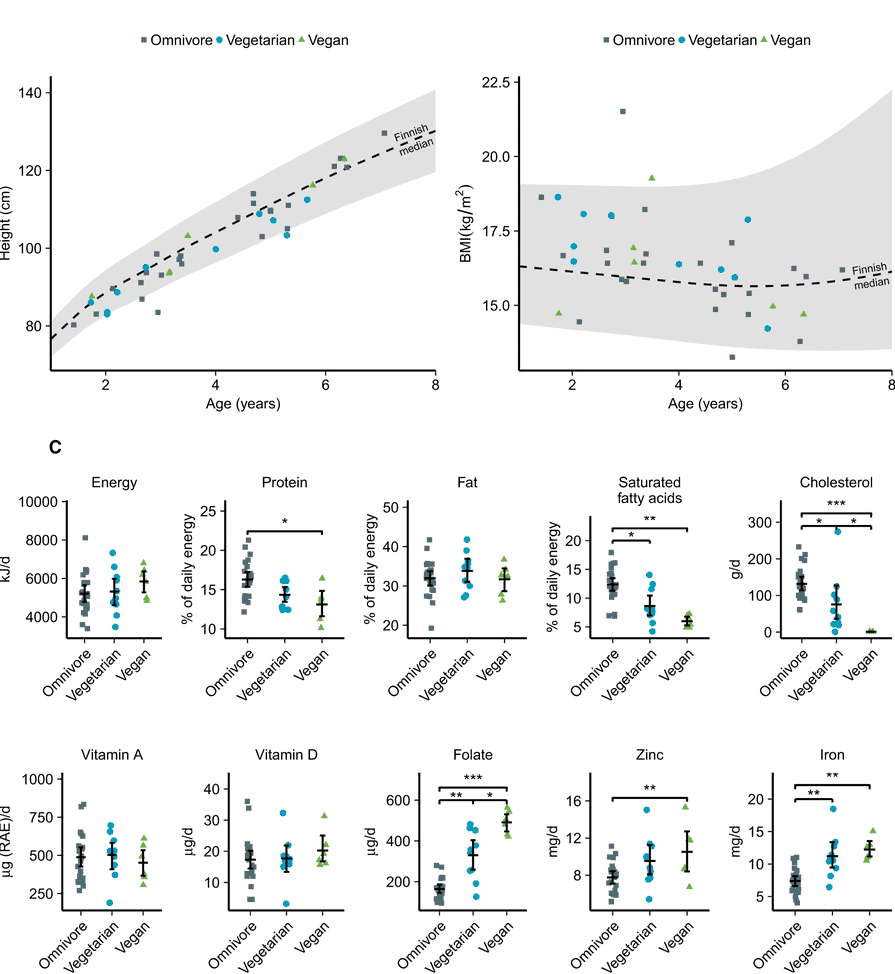
Source: Hovinen, T. Vegan diet in young children remodels metabolism and challenges the statuses of essential nutrients. (2021)
Children raised on a vegan diet are leaner
Like following any other diet, ensuring that children are getting enough vitamins and minerals is important for their growth and development. Not getting enough nutrients can lead to irreversible developmental disorders.[19]
Iodine deficiency and thyroid issues
An inflamed thyroid gland, commonly referred to goiter, causes swelling in the front of the neck due to thyroid issues.
This can include:
- Hypothyroidism (too little thyroid hormone – the most common thyroid issue)
- Hyperthyroidism (overproduction of the thyroid hormone)
Goiters can occur due to a lack of iodine in the diet
Goitrogens are substances in foods, such as cruciferous vegetables
- broccoli
- cauliflower
- cabbage
- brussel sprouts
- bok choy
- radish
- kale
- collard and mustard greens
- turnips
that can interfere with thyroid gland function. Goitrogens can inhibit the thyroid’s ability to produce thyroid hormone.
However, these foods should only be avoided if you have a known thyroid issue and/or iodine deficiency, such as hypothyroidism.[20]
Iodine deficiency is common in vegetarians and vegans that don’t consume enough iodine.
Vegans are more at risk of an iodine deficiency, compared to those who eat meat and dairy products.[21]
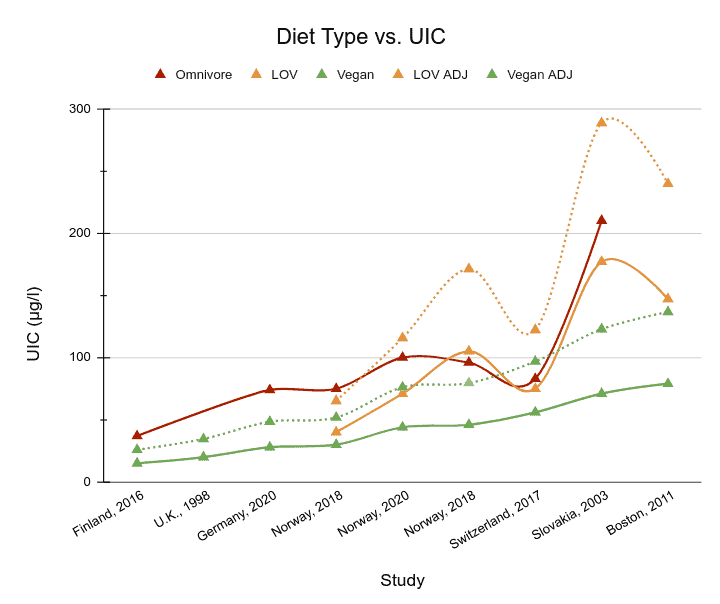
Source: Norris, J. Iodine. Vegan Health. (2021)
The main source of iodine in the western diet is iodised salt, and iodine is also found in meat and dairy products.
Plant-based sources of iodine include
- fortified plant based meat
- non-dairy cheese
- non-dairy milk
- seaweeds (such as nori and wakame)
RELATED — What is Seaweed and can it be our future food source
Other evidence shows that reducing animal product consumptions has a protective effect on reducing the risk of hypothyroidism. This could be due to lower levels of C-reactive protein (CRP) in vegetarian and vegan diets.[22]
Vegan and vegetarian diets and skin appearance
Overall, the evidence has shown that vegetarian and vegan diets have protective benefits for skin health.
Vitamin A, C, and E, healthy fatty acids, collagen as well as polyphenols are all antioxidants important for our skin health.
RELATED — Vitamin C (Immunity and Collagen booster)
Polyphenols are found in the following food sources
- fruits and vegetables
- olive oil
- herbs and spices (such as oregano and moringa)
- cocoa and dark chocolate
- beans and legumes (kidney and black beans)
- tea (green and black)
- wholegrains (wholewheat and rye)
- nuts and seeds
RELATED — Anti-cancer foods: The Healthiest Nuts (Part 1)
Polyunsaturated fats (PUFA) and monounsaturated fats (MUFA) are healthy fatty acids that are found in lean meat and seafood, but also in plant-based sources such as avocados, nuts and seeds, and certain types of oils.
Dairy and eggs also have a small amount of PUFA’s and MUFA’s.
RELATED — Types of Fats: Healthy and Unhealthy Dietary Fats
Collagen can be found in animal products, such as bones and bone broth, however foods rich in proteins such as lysine and glycine are important for collagen production. These can be found in plant-based sources such as fruits and vegetables, beans and legumes, and wholegrains such as quinoa.
As vegetarian and vegan diets are high in antioxidants, a wholefoods vegetarian and/or vegan diet has shown to be protective against skin conditions, such as dermatitis, eczema and acne.[23]
Related Questions
1. How to fix a leaky gut while on a plant-based diet?
Fermenting, soaking and sprouting legumes and grains can help reduce the antinutrients that the body struggles to digest.
This can help prevent and reduce gut permeability.
2. Can a long-term vegan diet cause irregular menstrual cycles?
If a vegan diet is low in fats, this can affect the hormones and in extreme cases can cause irregular menstrual cycles.
Also, it may cause amenorrhea (loss of menstrual cycle entirely).
3. Do individuals on a vegan and/or vegetarian diet have a lower bone density?
For some people vegan and/or vegetarian diets can cause lower bone mineral density.
However, if the diet is well-planned, these effects can be avoided.[12]
If you have just joined us on this topic, we suggest reading the first part of the article Health Risks of Long-term Vegan and Vegetarian Diet (Part 1).
Having passion for mental health and nutrition, Carly’s goal is to become a registered psychologist with a focus on self-care – food, exercise, and sleep. She has a special interest in various mental health disorders, plant-based diets, and the relationship between food and mood.
Through evidence-based research, holistic approach to health and personal experience, Carly hopes to empower others’ well-being.
Carly is a part of the Content Team that brings you the latest research at D’Connect.
References
(1) Isabel Iguacel, Inge Huybrechts, Luis A Moreno, Nathalie Michels, Vegetarianism and veganism compared with mental health and cognitive outcomes: a systematic review and meta-analysis, Nutrition Reviews, Volume 79, Issue 4, April 2021, Pages 361–381, Retrieved from: https://doi.org/10.1093/nutrit/nuaa030
(2) Jain R, Larsuphrom P, Degremont A, Latunde‐Dada GO, Philippou E. Association between vegetarian and vegan diets and depression: a systematic review. Nutrition Bulletin. 2022 Mar;47(1):27-49. Retrieved from: https://doi.org/10.1111/nbu.12540
(3) Ocklenburg, S. and J. Borawski, Vegetarian diet and depression scores: a meta-analysis. Journal of Affective Disorders, 2021. 294: p. 813-815. Retrieved from https://doi.org/10.1016/j.jad.2021.07.098
(4) Atli Arnarson. How to reduce anti nutrients in food. June 4 2017. Accessed online. Retrieved from https://www.healthline.com/nutrition/how-to-reduce-antinutrients#TOC_TITLE_HDR_5
(5) Sullivan V, Damani S. Vegetarianism and eating disorders—partners in crime? European Eating Disorders Review. 2000 Aug;8(4):263-6. Retrieved from: https://doi.org/10.1002/1099-0968(200008)8:4<263::AID-ERV367>3.0.CO;2-2
(6) Meesters, A.N. and Y. Meesters, Vegetarian or Vegan Diet: Stimulating or at Risk to Mental Health?, in Veganism-a Fashion Trend or Food as a Medicine. 2020, IntechOpen. Retrieved from https://www.intechopen.com/chapters/74243
(7) Liang G, Gong W, Li B, Zuo J, Pan L, Liu X. Analysis of heavy metals in foodstuffs and an assessment of the health risks to the general public via consumption in Beijing, China. International Journal of Environmental Research and Public Health. 2019 Mar;16(6):909. Retrieved from https://doi.org/10.3390/ijerph16060909
(8) Krajcovicová-Kudládková M, Ursínyová M, Masánová V, Béderová A, Valachovicová M. Cadmium blood concentrations in relation to nutrition. Cent Eur J Public Health. 2006 Sep;14(3):126-9. Retrieved from: doi: 10.21101/cejph.a3385. PMID: 17152224. 10.21101/cejph.a3385
(9) Michael Greger. Cadmium & Cancer: Plant vs. Animal Foods. Nutrition Facts. June 14 2014. Accessed online. Retrieved from https://nutritionfacts.org/video/cadmium-and-cancer-plant-vs-animal-foods/
(10) Mondoscience. 100% amino acid score. Oct 27 2017. Available online, retrieved from: https://www.mondoscience.com/blog/2017/10/25/100-amino-acid-score
(11) Lynch H, Johnston C, Wharton C. Plant-Based Diets: Considerations for Environmental Impact, Protein Quality, and Exercise Performance. Nutrients [Internet] 2018;10(12):1841. Retrieved from: http://dx.doi.org/10.3390/nu10121841
(12) Galchenko A, Gapparova K, Sidorova E. The influence of vegetarian and vegan diets on the state of bone mineral density in humans. Critical Reviews in Food Science and Nutrition. 2021 Oct 22:1-7. Retrieved from: https://doi.org/10.1080/10408398.2021.1996330
(13) Jillian Kubala. 16 foods that are high in choline. Healthline. Apr 7 2021. Accessed online, retrieved from: https://www.healthline.com/nutrition/foods-with-choline#2.-Organ-meat
(14) Wallace TC, Blusztajn JK, Caudill MA, Klatt KC, Natker E, Zeisel SH, Zelman KM. Choline: The Underconsumed and Underappreciated Essential Nutrient. Nutr Today. 2018 Nov-Dec;53(6):240-253. Retrieved from: doi: 10.1097/NT.0000000000000302. Epub 2018 Nov 13. PMID: 30853718; PMCID: PMC6259877.
(15) Guo EL, Katta R. Diet and hair loss: effects of nutrient deficiency and supplement use. Dermatol Pract Concept. 2017 Jan 31;7(1):1-10. doi: 10.5826/dpc.0701a01. PMID: 28243487; PMCID: PMC5315033. Retrieved from: https://www.ncbi.nlm.nih.gov/pmc/articles/PMC5315033/
(16) Ruiz-Tagle SA, Figueira MM, Vial V, Espinoza-Benavides L, Miteva M. Micronutrients in hair loss. Our Dermatol Online. 2018;9(3):320-328. Retrieved from: http://www.odermatol.com/odermatology/20183/25.Micronutrients-Ruiz-TagleSA.pdf
(17) Kristin Hall. Can a vegetarian diet cause hair loss? Forhims. Mar 24 2021. Accessed online. Retrieved from https://www.forhims.com/blog/can-a-vegetarian-diet-cause-hair-loss
(18) Sanders TA, Manning J. The growth and development of vegan children. Journal of Human Nutrition and Dietetics. 1992 Feb;5(1):11-21. Retrieved from: https://doi.org/10.1111/j.1365-277X.1992.tb00129.x
(19) Michaelsen KF, Neufeld LM, Prentice AM (eds): Global Landscape of Nutrition Challenges in Infants and Children. Nestlé Nutr Inst Workshop Ser. Nestlé Nutrition Institute, Switzerland/S. Karger AG., Basel, © 2020, vol 93, pp 103–110 Retrieved from: https://doi.org/10.1159/000503348
(20) Chandra AK. Goitrogen in food: cyanogenic and flavonoids containing plant foods in the development of goiter. Bioactive foods in promoting health 2010 Jan 1 (pp. 691-716). Academic Press. Retrieved from: https://doi.org/10.1016/B978-0-12-374628-3.00042-6
(21) Lightowler HJ, Davies G, Trevan M. Iodine in the diet: Perspectives for vegans. Journal of the Royal Society of Health. 1996;116(1):14-20. Retrieved from: doi:10.1177/146642409611600104
(22) Tonstad S, Nathan E, Oda K, Fraser G. Vegan diets and hypothyroidism. Nutrients. 2013 Nov 20;5(11):4642-52. doi: 10.3390/nu5114642. PMID: 24264226; PMCID: PMC3847753. Retrieved from https://www.ncbi.nlm.nih.gov/pmc/articles/PMC3847753/
(23) Solway J, McBride M, Haq F, Abdul W, Miller R. Diet and Dermatology: The Role of a Whole-food, Plant-based Diet in Preventing and Reversing Skin Aging-A Review. J Clin Aesthet Dermatol. 2020 May;13(5):38-43. Epub 2020 May 1. PMID: 32802255; PMCID: PMC7380694. Retrieved from: https://www.ncbi.nlm.nih.gov/pmc/articles/PMC7380694/

